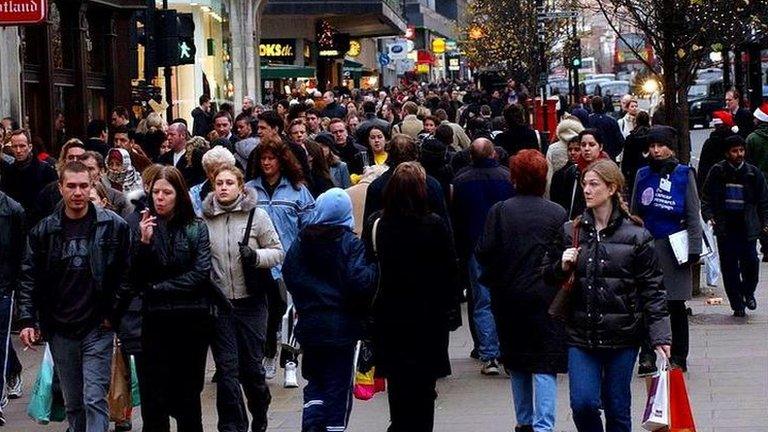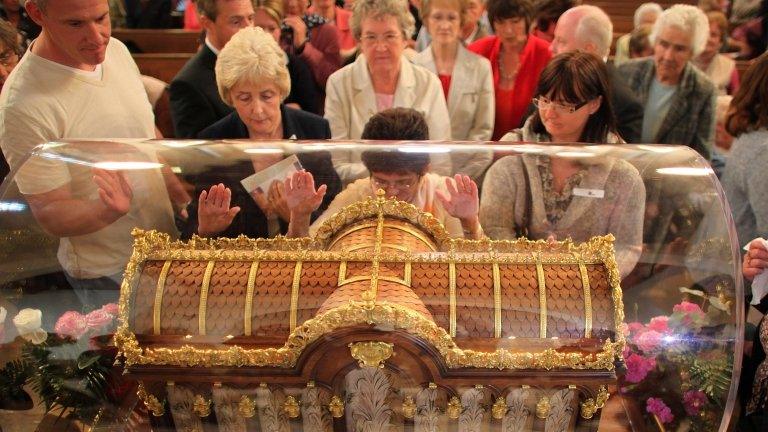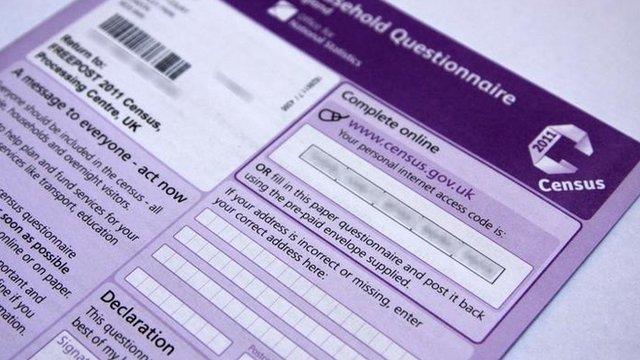Census 2011: Rapid change amid rapid immigration
- Published
- comments
Back in 2005, the BBC ran a project to map the modern face of the UK, so we could explain to our audiences the role immigration was playing in modern Britain.
The figures in the eventual Born Abroad report showed an unprecedented transformation that confirmed everything that we saw around us as we travelled around the country gathering stories of migration and change.
A decade on, that pace of change has increased.
What the census shows beyond any doubt is that the UK is in the midst of an astonishing era of demographic shift - and like the experience of many of its international peers, it is being driven by globalisation.
Ten years ago, there were some 4.3 million people in the UK who told the census that they had been born abroad. Almost all areas had been touched by changes from immigration - although in some areas the numbers were so small that it clearly amounted to little more than a family moving in or out - the phenomenon of a single Indian restaurant in a village, for instance.
In 2011, there were 7.5 million people born abroad living in England and Wales - up almost three million and taking their proportion of the population to 13%.
The UK is experiencing such rapid flows and movements of people from so many parts of the world, that parts of it can lay claim to being "super-diverse" - the idea that an area is home to so many people it's almost impossible to describe it in simple terms, such as home to one community or another.
The 2011 census used three measures to understand migration - it asked people where they were born, when they came to the UK and what passport they held. The Census also tried to capture who was a long-term migrant and who was only in the UK temporarily.
Inexact science
None of this is an exact science. For instance, the answer to who was born abroad includes large numbers of people whose parents served with the British Army in Germany. Asking people what passport they hold gives you a sense of identity - but nationality and identity can change.
Immigrants from Europe explain what brought them to Britain
But even with these kinds of understandable limitations, we have a very good idea of what is going on.
In 2001, the top three places where people were born abroad (excluding the Republic of Ireland) were India, Pakistan and Germany.
Poland lay 18th on the list - but over a decade numbers increased nine-fold as its workers came to the UK once the country joined the European Union.
The change has been so rapid that almost half of those born abroad arrived in the decade leading up to the 2011 census.
All regions witnessed an increase - although the changes varied greatly from area to area. London, already a global city in 2001, became more so, with its boroughs holding all the places in the diversity top 10.
EU workers
One of the key drivers of the change was the expansion of the EU and the arrival of Polish workers. If you want just a snapshot of that change - look at Boston in Lincolnshire.
In 2001, it was home to fewer than 1,500 people born abroad - and because of the statistical quirk I've already mentioned, some of those were Brits born in Germany.
Today, almost 10,000 people born abroad call Boston home - 3,000 of them from Poland, more than any other local authority outside of the South East.
The greatest numerical change has however been in London. In 2001, almost two million people in the capital were born abroad. Today it is almost three million. If anyone doubted that London was now a world city, rather than just the capital of the UK, the figures say different. Only 44% of people in London now describe themselves as white British. In the east London borough of Newham, fewer than a fifth of the population described themselves so.
Four out of every 10 people in London in 2011 were foreign-born - up from three in 10 in 2001.
Overall, four London boroughs - Newham, Brent, Westminster and Kensington and Chelsea are now home to a majority who were born outside of the UK. Three other parts of the capital are not far off.
The history of migration was once the story of cities: We had very distinct communities in specific places - an African-Caribbean community in London or Birmingham, for instance, and Indian or East African Asian people in Leicester.
Large historic communities remain - but there is also greater geographic spread among newcomers. For instance, some 90% of the Poles in the UK are spread across England and Wales in community after community.
So overall, increasing change, rapid change and increasing diversity.
Is this something happening to the UK alone? It lies 12th in the list of EU nations when you look at the proportion of people in each nation who were born abroad.
But England and Wales comes top in this category when you rank it alongside France, Germany and Italy - the other states with populations of over 50 million.
The 2001 census confirmed the change in the face of Britain - the 2011 census confirms that the change continues.
- Published11 December 2012

- Published11 December 2012

- Published11 December 2012

- Published11 December 2012
